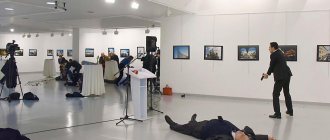Attempted crime is a type of criminal institution such as an unfinished socially dangerous attack. An attempt is always the second stage of the implementation of an offense, which is preceded by preparation for the act committed. Attempted crime and its types presuppose separate principles for imposing punishment and applying restrictive measures against the perpetrator.
Multi-channel free hotline Legal advice on criminal law. Every day from 9.00 to 21.00
Moscow and region: +7 (495) 662-44-36
St. Petersburg: +7 (812) 449-43-40
Signs of attempted crime
The objective side of an attempt “is characterized by the direct focus of a person’s action on committing a crime; incompleteness of the assault for reasons beyond the will of the perpetrator.”
Objective signs of an attempt described in Part 3 of Art. 30 of the Criminal Code of the Russian Federation as “actions (inaction) directly aimed at committing a crime, in essence, are determined by the elements of a crime provided for by the Special Part of the Criminal Code of the Russian Federation.”
The subjective sign of an attempt is direct intent.
Subjective characteristics : “the intentional nature of an action (inaction) directly aimed at committing a crime, when a person is aware of the social danger of his actions (inaction) directly aimed at committing a crime, and wants to commit them (in an attempt to commit a formal crime) or is aware of the social danger the danger of one’s actions directly aimed at committing a crime, foresees the inevitability or possibility of socially dangerous consequences and desires their occurrence.”
Kinds
Types of attempted crimes are also reflected in detail, both in Russian law and in theory. The influence of the classification of such a stage is indirect in determining the degree of punishability of a particular act. For example, if a person decides to kill someone, applying a specific sanction would require determining whether the attempt itself was completed or whether the actions in question were not completed.
The type of attempted crime cannot change the upper limit of the punishment provided for such an act, regardless of the gravity of the act.
Two groups of options for carrying out an assassination attempt should be distinguished, each of which will reflect the particularities of the practical nature of the act.
The first group includes the following types:
- Finished. It is important to understand that here we are talking about the issue of the completion of the attempt, and not the entire criminal enterprise as a whole. It is assumed that the perpetrator took all necessary actions to achieve the criminal result, but it did not occur due to circumstances unforeseen by the person.
- Unfinished. Not all actions that should help achieve a criminal result will be carried out here. The path of the guilty person must also be interrupted due to circumstances beyond his control.
Accordingly, it is important to indicate the beginning of the implementation of the objective side, which will serve as the basis for designating the person’s actions as an attempt.
The second group concerns how and in relation to what (whom) the act is committed. The following are included here:
- assault with unsuitable means, the use of objects that cannot in any way cause harm to the object of the crime due to the lack of the properties required for this;
- an encroachment on a worthless object, that is, on a relationship (victim, object) that does not exist in reality, for example, killing a mannequin rather than a person.
The qualification of an act when establishing the fact of unfitness will also be carried out according to general rules.
When it comes to the unsuitability of an object, it is important to understand that even in the actual absence of such an offense, the elements of a dangerous offense will still be considered full-fledged, and therefore will give rise to the possibility of bringing the guilty person to justice.
Judicial practice: Attempted crime
Let's analyze an example from judicial practice, namely, the Decision of the Magistrate of the judicial district No. 11 of the Kirov judicial district of Samara in case 1-15/2018 dated March 15, 2021 [11]. Brief essence of the plot of the case: <DATE27> at approximately 11 hours 10 minutes, Zhukova A.N., being in the store “<OBEZLIChENO>”, located in the Kirovsky district of Samara, at the address: <ADDRESS> saw displayed on sale of goods, namely: GILL FUSION shaving cassettes worth 1063 rubles 46 kopecks excluding VAT for 1 package and GILL Mach-3 shaving cassettes costing 462 rubles 50 kopecks excluding VAT for 1 package, owned by <IMPERSONAL>”. At the same time, at Zhukova A.N. there was an intent to secretly steal someone else’s property belonging to <IMPERSONAL>”.
In order to implement her criminal intent aimed at illegally seizing someone else's property, Zhukova A.N., guided by selfish motives, secretly, taking advantage of the absence of sellers and other strangers, making sure that no one was watching her actions, took one by one from the shelves in her hands the above goods, namely: GILL FUSION shaving cassettes in the amount of 4 packages, costing 1063 rubles 46 kopecks excluding VAT for 1 package, total cost 4253 rubles 84 kopecks and GILL Mach-3 shaving cassette costing 462 rubles 50 kopecks excluding VAT for 1 package, and a total of 4716 rubles 34 kopecks and put it in a bag with her.
Not wanting to stop her criminal actions, Zhukova A.N. Having illegally taken possession of the stolen property and keeping it with her, she tried to escape from the scene of the crime. However, Zhukova A.N. she was unable to complete her criminal intent aimed at secretly stealing someone else’s property due to circumstances beyond her control, as she was detained by employees of the Carousel store. In case of completion of his criminal intent aimed at secretly stealing someone else's property, Zhukova A.N. would have caused "UNPERSONAL" material damage in the total amount of 4,716 rubles 34 kopecks, excluding VAT.
Zhukova A.N. admitted guilt and repented of what she had done, confessed, has a dependent young disabled child <FULL NAME2> D., <DATE4> of birth, takes care of an elderly grandmother, has chronic diseases, including: HIV, hepatitis C, pyelonephritis, the court, in accordance with clauses “i”, “d”, part 1, part 2 of article 61 of the Criminal Code of the Russian Federation, recognizes these circumstances as circumstances mitigating the punishment.
In accordance with paragraph “a” of Part 1 of Article 63 of the Criminal Code of the Russian Federation, the court recognizes as an aggravating circumstance the relapse of crimes provided for in Part 1 of Article 18 of the Criminal Code of the Russian Federation (sentence from <DATE7> Oktyabrsky District Court of Samara).
Thus, analyzing the court’s decision, we can conclude that all the signs of an attempted crime are present, namely the presence of direct intent to secretly steal someone else’s property; the presence of actions directly aimed at committing a crime, in essence; incompleteness of criminal intent aimed at secretly stealing someone else's property.
In judicial practice, there is a fairly large number of criminal cases related to attempted crime and terminated due to the use of the parties. As judicial practice shows, such cases mainly include cases where crimes of minor gravity were committed. Let's consider one of these cases, namely the Decision of the Magistrate of Court District No. 215 of the Tikhoretsky District of the Krasnodar Territory in case 1-6/2018 dated March 13, 2021. The crime is committed under the following circumstances:
<DATE6> during the period of time from <IMPERSONAL>, a more exact time has not been established by inquiry, <FULL NAME3> being on agricultural land having a cadastral number <NUMBER> and located at the address: <ADDRESS>, where corn grows variety "Futurix", which is in the stage of full ripening, with the intent to secretly steal someone else's property, namely, corn cobs belonging to <IMPERSONAL>, making sure that there is no one nearby, no one sees him and no one is watching him, secretly from others , realizing the social danger of his actions, foreseeing the inevitability of socially dangerous consequences in the form of causing property damage to the victim and wishing for their occurrence, plucked 1,220 pieces of corn cobs, weighing 373.7 kg, from the growing stalks of corn, belonging to "OBEZLIChENNO" worth 2,690 rubles 64 kopecks . However, the defendant was unable to carry out his criminal intent and dispose of the stolen property at his own discretion due to circumstances beyond his control, as he was stopped by the employees of <IMPERSONAL>
He also committed attempted theft, that is, the secret theft of someone else’s property, if the crime was not completed due to circumstances beyond the control of this person.
So, <DATE7> during the period of time from <IMPERSONAL>, a more exact time has not been established by the inquiry, Avakyan G.D. being on agricultural land, having a cadastral number <NUMBER> and located at the address: <ADDRESS>, where the sunflower variety "SPK Gin" grows, which is in the full ripening stage, with the intent to secretly steal someone else's property, namely sunflower seeds belonging to <IMPERSONAL>, making sure that there is no one nearby, no one sees him and no one is watching him, secretly from others, realizing the social danger of his actions, foreseeing the inevitability of socially dangerous consequences in the form of causing property damage to the victim and desiring their occurrence , using a knife, cut off sunflower baskets from sunflower stems belonging to <OBEZLICHENNO>, some of which he put into seven polymer bags, however, he was unable to complete his criminal intent due to circumstances beyond his control, since he was stopped by employees of <OBEZLICHENNO > The weight of the sunflower seeds that the defendant tried to steal was 48.3 kg, costing 3,139 rubles 50 kopecks.
The court came to the conclusion that the defendant G.D. Avakyan committed a crime of minor gravity, has not been convicted, at the place of residence the defendant is characterized as "UNPERSONAL", "UNPERSONAL", agrees to the termination of the criminal case in connection with reconciliation, and the court finds it possible to terminate the criminal case against him on the basis of Article 25 of the Criminal Procedure Code Code of the Russian Federation and Article 76 of the Criminal Code of the Russian Federation, that is, in connection with reconciliation with the victim.
Thus, we can state the fact that the legislator has provided for the possibility of terminating criminal cases of minor and medium gravity in the event of reconciliation between the defendant and the victim, while the resolution of this issue is made dependent on the will of the victim, subject to the conditions set out in the law.
In the process of studying criminal cases, it was established that in the vast majority of cases, the investigation of an unfinished crime was carried out together with the investigation of other unfinished or completed criminal acts within the framework of one proceeding. In addition, often in the materials of the same criminal case, two or more subjects appeared as alleged subjects of illegal activities, who often acted as defendants, suspects and accused not only of an unfinished crime, but often also of completed illegal acts.
In general, it can be stated that in more than half of the studied criminal cases of illegal activities related to unfinished crimes, more than one subject of illegal behavior appears. Somewhat less frequently, but also in the totality of criminal case materials studied, cases are described when in an illegal activity associated with at least one unfinished crime, only one attacker acted as a suspect, accused or defendant.
Another feature of unfinished crimes is that they are often carried out by their subjects not only in the form of simple complicity (that is, when two or more people participate in an unfinished crime, acting as perpetrators or co-perpetrators in relation to each other and their roles in crime). Often, criminals also commit them in a complex form of complicity, when not only the perpetrators, but also the organizers and (or) instigators and (or) accomplices participate in the crime.
Often, organizers, instigators or accomplices of unfinished crimes (i.e. persons involved in a complex form of complicity) appear in the case materials as the only suspects, accused and (or) defendants, in the absence of suspected (accused, defendants) perpetrators, which is a rarity for many other categories of crimes, where these persons are most often brought to criminal responsibility together with the direct perpetrators of the crimes.
Thus, among other problems existing in the area under study, one can also point out some imperfections in the modern legislative framework, in particular, its individual norms regulating issues related to the qualification of a particular type of unfinished crime, as well as possible forms of complicity of those who committed it subjects.
In the process of studying criminal cases, it turned out that in the vast majority of cases, attempted crimes are identified and investigated, and much more rarely - preparations for such. This is due to the fact that in the process of preparing for a crime, the attacker leaves significantly fewer traces of his illegal behavior than when attempting to commit a particular illegal act.
Indeed, an attempted crime also covers and absorbs the preparation stage, but is not limited to it. Thus, cases are most often classified as attempts when the attacker has already begun to commit the crime itself, provided for by one or another norm of the Special Part of the Criminal Code, and, as a rule, he has already completed the preparation for the crime by this moment.
In addition, it is often much more difficult to prove preparation for a crime than an attempted crime, since most likely the attacker will try in every possible way to justify and argue that he does not have any criminal intent and purpose when committing certain actions similar to signs of preparation for a crime. crime.
It has been established that the vast majority of cases considered involve crimes of minor and medium gravity, but not serious and especially serious crimes. Attempted crimes of minor and medium gravity make up the highest proportion among the total number of unfinished latent (i.e., not detected and not investigated) illegal attacks. In addition to other trends, we were also able to identify the most typical groups of unfinished illegal attacks, including: crimes against life and health; property crimes; crimes against sexual integrity and sexual freedom of the individual.








